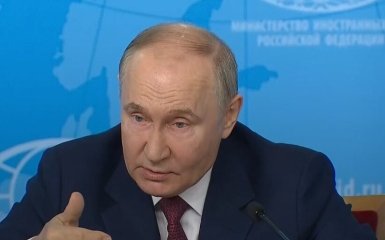Before the start of the Global Summit in Switzerland, where the Ukrainian Peace Formula will be considered, the illegitimate dictator of Russia, Vladimir Putin, began to generate accusations against the President of Ukraine, Volodymyr Zelenskyi.
Points of attention
- Putin called the Peace Summit in Switzerland a ploy to legitimize Zelenskyy and called the Ukrainian government illegitimate.
- Putin has accused the West of trying to isolate Russia but says those efforts have failed.
- During the Global Peace Summit, Putin boasted about BRICS expansion and expressed views on multipolarity worldwide.
- The Russian dictator spoke about creating an indivisible security system and the collapse of the NATO security system.
- Because of differences with the West, Putin said a unique chance to build a reliable security system had passed.
Putin falsely called the Peace Summit in Switzerland tricks to legitimise Zelenskyy
The Russian dictator once again repeats the "mantra" about the illegitimacy of the President of Ukraine.
Allegedly, the documents currently being signed in Kyiv at the state level cannot have legal force, "such contracts are null and void."
Putin blamed the West, which, in his opinion, "launched a stormy and unceremonious campaign to isolate Russia after the start of the special operation, but it obviously failed."
The bloody dictator is convinced that the conference in Switzerland regarding Ukraine is a ploy to "send the discussion on the wrong track" and to mark the legitimacy of the Kyiv authorities.
Putin boastfully announced the collapse of the NATO security system
The Russian dictator spoke about the formation of multipolarity in the world against the background of the start of the work of the Global Peace Summit regarding Ukraine, which Russia dreams of disrupting.
Putin hypocritically believes that more and more countries are striving for self-sufficiency. And the Russian Federation is interested in dialogue on the creation of an indivisible security system taking place, in particular, within the walls of the UN."
Also, the illegitimate head of Russia boasted about the expansion of BRICS, which, according to him, "will become one of the foundations of the multipolar world."
At the end of the last century, the world had a unique chance to build a reliable security system, the Russian Federation was ready for it, but the West believed differently, Putin traditionally said accusing the free world.




